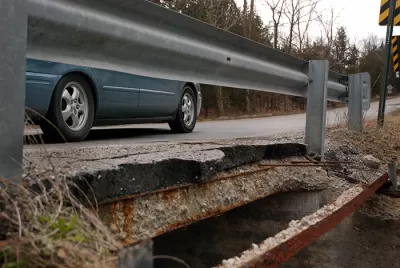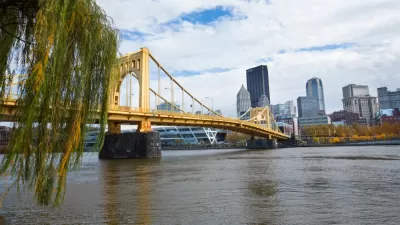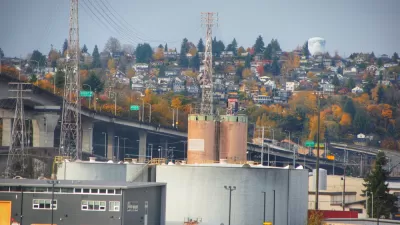The news satire show "Last Week Tonight with John Oliver" gave comic treatment to the country's ever-present, much-neglected infrastructure crisis. It's hilarious and scary. At the same time!

"Last Week Tonight with John Oliver" will help reverse the lack of attention paid to the country's infrastructure (along with a recent "60 Minutes" segment and, of course, constant coverage by Planetizen).
According to Oliver, the country finds it easy to ignore its crumbling infrastructure because: "We tend to find it a bit boring." Or, put another way: "Most people find infrastructure boring."
The show starts by examining dams, noting that the average age of dams in the country is 52 years, but they get very little in the way of inspections. The state of Alabama, for instance, completely lacks inspectors for its dams. "That means that the state of Alabama has exactly the same number of dam inspectors as the band Alabama," cracks Oliver.
The show then switches its focus to bridges, borrowing heavily from the unintentional comedy of the recent "60 Minutes" feature on infrastructure. So, for instance, the Oliver notes the troubling nature of former Transportation Secretary Ray LaHood saying, "I don't want to say they're unsafe, but they're dangerous."
With consensus like this, how did things get so bad? Oliver turns to the Highway Trust Fund, and the gas tax that funds it, as an example of the inability of Congress to act. The problem, as we know, is that taxes are incredibly unpopular, and some in Congress aren't working as hard as they say there to find a new source of funding to replace the gas tax. This tweet from the show make's their opinion known:
Finally, the segment concludes with a star-studded fake movie trailer that tells viewers to "brace yourself for 98 minutes of incremental maintenance." Edward Norton delivers the line "Left loosey, righty tighty" in a particularly tense moment. And Steve Buscemi kills it as the "best damn inspector in the business," who is, "here to inspect this dam."
Robert Puentes reacts to the segment in a post for Brookings, finding a lot to agree with in the show's jokes and satire, but also noting one omission that was probably too complex for the show to fit into a 21-minute comedy segment:
"…it missed the mark by failing to recognize the diverse and highly fragmented ways that America selects, builds, maintains, operates, and pays for assets as different as public transit, telecommunications, and water. To be sure, for certain sectors federal spending is relatively high, such as transportation and water for which federal spending averaged $92.15 billion each year from 2000 to 2007. But even for those sectors, the federal share of total spending was never higher than 27 percent during that time. How choices are made about American infrastructure is exceedingly complex and depends on funding sources, jurisdictional concerns, and political negotiations."
The full segment is available in the video below.
FULL STORY: Last Week Tonight with John Oliver: Infrastructure (HBO)

Planetizen Federal Action Tracker
A weekly monitor of how Trump’s orders and actions are impacting planners and planning in America.

Maui's Vacation Rental Debate Turns Ugly
Verbal attacks, misinformation campaigns and fistfights plague a high-stakes debate to convert thousands of vacation rentals into long-term housing.

San Francisco Suspends Traffic Calming Amidst Record Deaths
Citing “a challenging fiscal landscape,” the city will cease the program on the heels of 42 traffic deaths, including 24 pedestrians.

Defunct Pittsburgh Power Plant to Become Residential Tower
A decommissioned steam heat plant will be redeveloped into almost 100 affordable housing units.

Trump Prompts Restructuring of Transportation Research Board in “Unprecedented Overreach”
The TRB has eliminated more than half of its committees including those focused on climate, equity, and cities.

Amtrak Rolls Out New Orleans to Alabama “Mardi Gras” Train
The new service will operate morning and evening departures between Mobile and New Orleans.
Urban Design for Planners 1: Software Tools
This six-course series explores essential urban design concepts using open source software and equips planners with the tools they need to participate fully in the urban design process.
Planning for Universal Design
Learn the tools for implementing Universal Design in planning regulations.
Heyer Gruel & Associates PA
JM Goldson LLC
Custer County Colorado
City of Camden Redevelopment Agency
City of Astoria
Transportation Research & Education Center (TREC) at Portland State University
Jefferson Parish Government
Camden Redevelopment Agency
City of Claremont





























